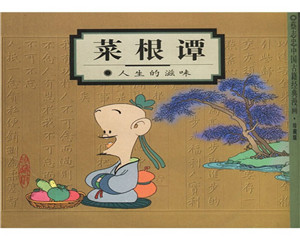《菜根谭》是元末明初道人洪应明收集编著的一部论述修养、人生、处世、出世的语录世集。本节大意:清廉而有容忍的雅量,仁慈而又能当机立断,精明而不防害细察,刚正而又不至执撒,这种道理就像蜜饯虽然浸在糖里即不过分的甜,海产的鱼虾虽然腌在缸里却不过分的咸,一个人要能把持住不偏不倚的尺度才算是处人 做事的美德。

《菜根谭》(君子懿德、中庸之道)
清能有容,仁能善断,明不伤察,直不过矫。是谓蜜饯不咸,海味不咸,才是懿德。
To be honest and clean oneself and yet have patience and tolerance towards others; to have a benevolent heart, and yet show discernment at the same time; to have clear insight, and yet have the forbearance to refrain from over-harsh judgements; to be upright and outspoken, and yet have the self-control not to exceed the proper limits—all these add up to proper conduct. Just as candied fruit should not be too sweet and seafood should not be too salty, a person's conduct should be pleasing but just right.
(保罗·怀特 译)
To be pure and upright in morality, and yet magnanimous in bearing; to be kindhearted and righteous in behavior, and yet acute in judgment; to be clear-sighted in observation, and yet no excessive in demand; to be forthright in character, and yet not aggressive in action—all these are excellent qualities that are esteemed as the doctrine of the mean, saying that the candied fruit should not taste too sweet and seafood not too salty.
(周文标 译)
To be honest and yet tolerant, benevolent and yet decisive, shrewd and yet not exacting, upright and yet not affected: this is like candied fruit being not too sweet, or brine being not too salty—the real virtue in a man.
(蒋坚松 译)
更多精品翻译素材,敬请关注可可英语。












